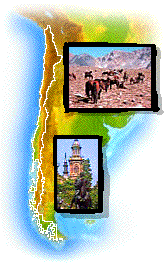|
|
|
|
|||||
|
networked access | networked learning | networked society | networked economy | networked policy | offshore opportunity |
|||||||
|
Introduction
|
Introduction to Chile Chile was originally under the control of the Incas in the north and the nomadic Araucanos in the south. In 1541, a Spaniard, Pedro de Valdivia, founded Santiago. Chile won its independence from Spain in 1818 under Bernardo O'Higgins and an Argentinian, José de San Martin. O'Higgins, dictator until 1823, laid the foundations of the modern state with a two-party system and a centralized government. The dictator from 1830 to 1837, Diego Portales, fought a war with Peru from 1836—1839 that expanded Chilean territory. Chile fought the War of the Pacific with Peru and Bolivia from 1879 to 1883, winning Antofagasta, Bolivia's only outlet to the sea, and extensive areas from Peru. Pedro Montt led a revolt that overthrew José Balmaceda in 1891 and established a parliamentary dictatorship lasting until a new constitution was adopted in 1925. Industrialization began before World War I and led to the formation of Marxist groups. Juan Antonio Ríos, president during World War II, was originally pro-Nazi but in 1944 led his country into the war on the side of the Allies. In 1970, Salvador Allende became the first president in a non-Communist country freely elected on a Marxist program. Allende quickly established relations with Cuba and the People's Republic of China, introduced Marxist economic and social reforms, and nationalized many private companies, including U.S.-owned ones. In Sept. 1973, Allende was overthrown and killed in a military coup covertly sponsored by the CIA, ending a 46-year era of constitutional government in Chile. Chile is one of
the most advanced countries in Latin America. With a relatively small
population size when compared to Brazil and Argentina, Chile’s ICT has
a greater impact on its population than the other countries in the
region. When you begin
to consider things like literacy rate that is in the mid 90’s, you
begin to realize the potential Chile has. The government has setup
lucrative incentives for technology-based companies interested in
setting up operations in Chile. In a mere seven years, they have grown
outsourcing revenue from zero to over a billion dollars. The government
policies in Chile over the last decade have demonstrated a strategic
shift in the importance of technology infrastructure in the country’s
growth; and it’s working really well. Forecasts from numerous analysts
project continued growth at a fast clip. While Chile may not necessarily
become an outsourcing powerhouse, it is proving that state of ICT will
remain better than most developing nations and at the top in its
continent. |
|
|||||


